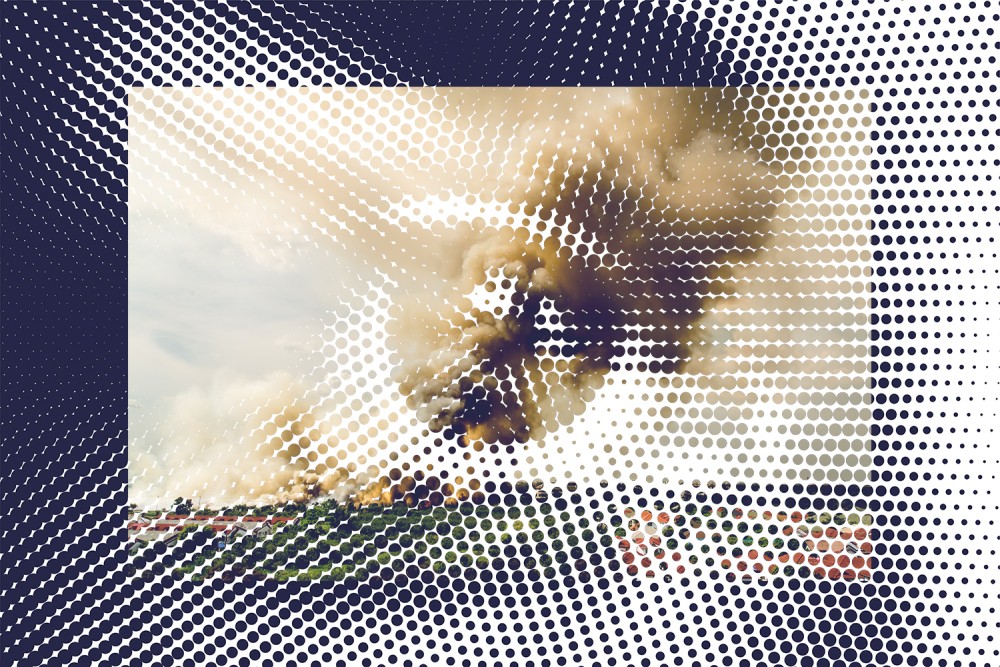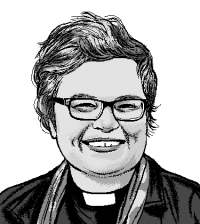Facing a world on fire
The contemplative life is about getting closer to reality, not retreating from it.

Century illustration (Source images: Getty)
If I told you I’ve come to believe that the best way to respond to the climate crisis is the cultivation of the contemplative life, I’d expect raised eyebrows. You might reasonably reply that, no, now is the time for action, both corporately and individually, rather than contemplation. I hear that. Anyone with eyes to see and ears to listen knows we have reasons for disquiet about the future of our planet. The crisis we’re facing should, one might argue, stimulate any right-thinking person to fresh social and political action. In contrast, the word contemplation carries implications of retreat, of detachment and cool consideration.
I hear the insistence that contemplation, whatever its place as a therapeutic response to eco-anxiety, does not represent a serious public action to address our climate emergency. I wonder, however, if such a reaction relies on a misrepresentation of the word contemplation. Rowan Williams recently pointed out that the word contemplation is intimidating. It has, he says, too many syllables. The very word makes us think contemplation is both difficult and too esoteric to be practically valuable.
Read our latest issue or browse back issues.
Theoria, the Greek root for contemplation, means “watching” or “looking.” This suggests that contemplation is not so much about stilling ourselves or heading inward in order to find better strategies to cope with the world. Rather, it is about paying attention to what is really going on. And according to theologian Janet Soskice, “attention is rewarded with reality.”
For me, then, the contemplative life is about getting closer to reality rather than retreating from it. This means that when I pray or come to silence, I am trying to attend to what is actually going on. The contemplative is prepared to turn their face toward the horror of a world on fire—itself no inconsiderable feat, when many of us want to look away or bury our heads in the sand—while simultaneously seeking to respond to this fearful situation in the love of God.
This work of theoria has three key dimensions: seeking to perceive the world as it is, trying to see God as present in the world as it is, and seeking to be receptive to what God is up to in this world and to offer a truthful and holy response. The contemplative life is a work of education in the truth: we seek to look well, that is, as God would have us look. It is a call to respond to God’s patient, gracious attention to the world as it is.
Madeleine Delbrêl, the often overlooked Catholic spiritual writer who was recently proclaimed venerable by Pope Francis, provides a helpful way for us to live out this contemplative approach. For her, contemplation is found in loving attention to the circumstances of our daily lives. Instead of hiding from the mess of our world, Delbrêl suggests that as we attend deeply to our daily struggle to act for the good, we begin to act hopefully. She says that while those who live in enclosed community, such as monks and nuns, might treat their abbot or abbess as their superior, the rest of us can make the circumstances of our daily life our superior.
Delbrêl reminds us that life—even when it’s tough—can provide the shape of our obedience to find and follow God. “We, the ordinary people of the streets, believe with all our might that this street, this world, where God has placed us, is our place of holiness,” she writes. Delbrêl didn’t work and live in comfortable circumstances but in the rough-and-tumble of a poor Paris district during World War II. Life came at her full on. Still, she suggests that this kind of in-the-world contemplative seeks, like all contemplatives, to harvest the signs of God in the world: to collect and accumulate them so that we can then make the appropriate response. Delbrêl—a professional social worker who supported worker priests, among others—suggests that our shared vocation is to show fidelity to the stuff of life and stand up for the ways of God.
This is more than seeing God in the secular world, and it goes beyond starry-eyed wonder. For Delbrêl it is a recognition that what is happening—whether war, climate change, the daily struggle to live, or whatever—will make demands on you. She says that the contemplative is always poised to live between two seeming gulfs: the “measurable abyss of the world’s rejections of God” and the “unfathomable abyss of the mysteries of God.” The Christian is called to dwell in the border where the two abysses intersect. At this borderland, we become bridges and mediators to love.
For such a seeming activist, Delbrêl knew the power of silence. She calls even the most active of us to its contemplative riches. “Silence,” she says, “leads us to make a gift of self rather than a selfishness that has been gift-wrapped. . . . Silence does not mean running away but rather recollecting ourselves in the open space of God.” It becomes, then, a gift through which we are more exposed to God. Its abiding power, however, is how the God found in silence leads us to another gift: the gift of ourselves in a world in desperate need.
Perhaps being a contemplative is not the wrong response to a world pulling itself apart. It certainly isn’t a retreat from reality or a means of indulging private visions of God. Delbrêl reminds us that whether in the riches of silence or in the determination to make the circumstances of our lives the place where God is known, contemplation calls us out to face the world and offer a holy, generous response.






